What are your #webstories?
Starting today, we celebrate the 25th anniversary of the World Wide Web Consortium (W3C). Sir Tim Berners-Lee, our Director and the inventor of the World Wide Web, founded the Web Consortium on this day, 1 October 1994 to ensure the long-term growth of the Web, and since then, we have worked to create a Web that is accessible to all, whatever their hardware, software, network infrastructure, native language, culture, geographical location, or physical or mental ability; a Web that works for everyone, a Web which is good for all.
At the occasion of our 25th year, we are re-introducing ourselves to our community with some history, pictures, web stories, tweets, and videos. I hope you join us in celebrating and we invite you to share your birthday wishes and tell us your own #webstories.
How can you participate?
We invite you, our community, to tell your #webstories. Share your story of the web and your hopes and fears for its future. If you’d be willing, share an image of yourself, an early web page or something else which is meaningful to you about your participation in the Web and/or the Web Consortium.
In the spirit of the famous Proust Questionnaire, you could build your #webstories from the following questions:
- How did you come to the Web or the Web Consortium?
- What was the first time you used the Web or how did you first encounter the W3C?
- Did you have a history with tech before the Web or has it always been part of your life?
- What are you working on or focusing on now?
- What is your greatest fear for the Web?
- What is your greatest hope for the Web?
- What is your motto (for yourself or the web)?
Please use #w3c25 and/or #webstories on social networks to share your story, share photos, screenshots, gifs, or videos - whatever you prefer! If you wish to have your story "card" created, please, send us two or three short paragraphs, your picture, name, title and organization, and we will be happy to add it to the #webstories.
Happy 25th birthday, Web Consortium! 🎉
#webstories
Recently we asked some members of our community how they had been drawn to the Web, their hopes and fears for the Web, and what gets them excited about the web and its future
Amongst those we talked to were some who had helped build the basis of Web technology and had been working in technology before the Web was invented 30 years ago, as well as several people who were born after the Web, have always used it and are helping to build its future.
Not one person had the same journey leading us to the Web! People came from all walks of life, many countries, but every single one of us was amazed by the Web and continue to be in awe of its potential. We all expressed that we hold very dearly the goal of making the Web a better and safer place for everyone. But please, see below for yourself!
Show Jun Murai's full quote 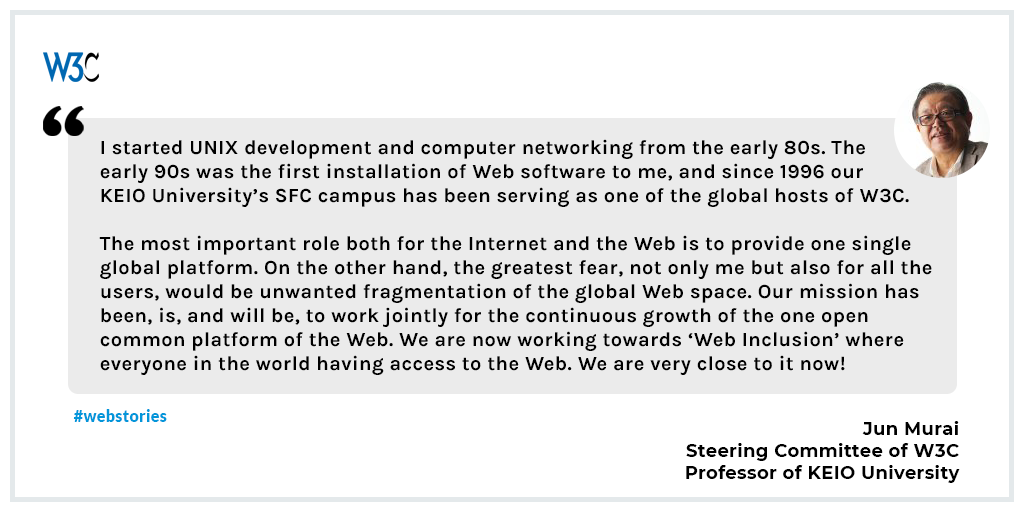
Jun Murai, Steering Committee of World Wide Web Consortium / Professor of KEIO University: I started UNIX development and computer networking from the early 80s. The early 90s was the first installation of Web software to me, and since 1996 our KEIO University’s SFC campus serving one of the global hosts of W3C. The most important role both for the Internet and the Web is to provide one single global platform. On the other hand, the greatest fear, not only me but also for all the users, would be unwanted fragmentation of the global Web space. Our mission has been, are, and will be, is to work jointly for the continuous growth of the one open common platform of the Web. We are now working for ‘the Web Inclusion’ where everyone in the world having access to the Web. We are very close to it now!Show Thomas Wisniewski's full quote 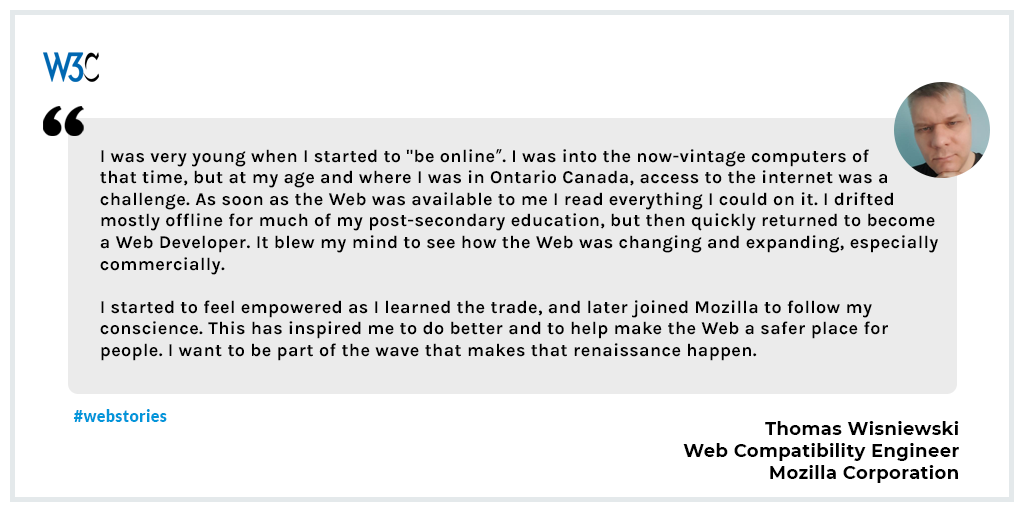
Thomas Wisniewski, Web Compatibility Engineer, Mozilla Corporation: I was very young when I started to "be online”. I was into the now-vintage computers of that time, but at my age and where I was in Ontario Canada, access to the internet was a challenge. As soon as the Web was available to me I read everything I could on it. I drifted mostly offline for much of my post-secondary education, but then quickly returned to become a web developer. It blew my mind to see how the web was changing and expanding, especially commercially. I started to feel empowered as I learned the trade, and later joined Mozilla to follow my conscience. This has inspired me to do better and to help make the Web a safer place for people. I want to be part of the wave that makes that renaissance happen.Show Helen Garneau's full quote 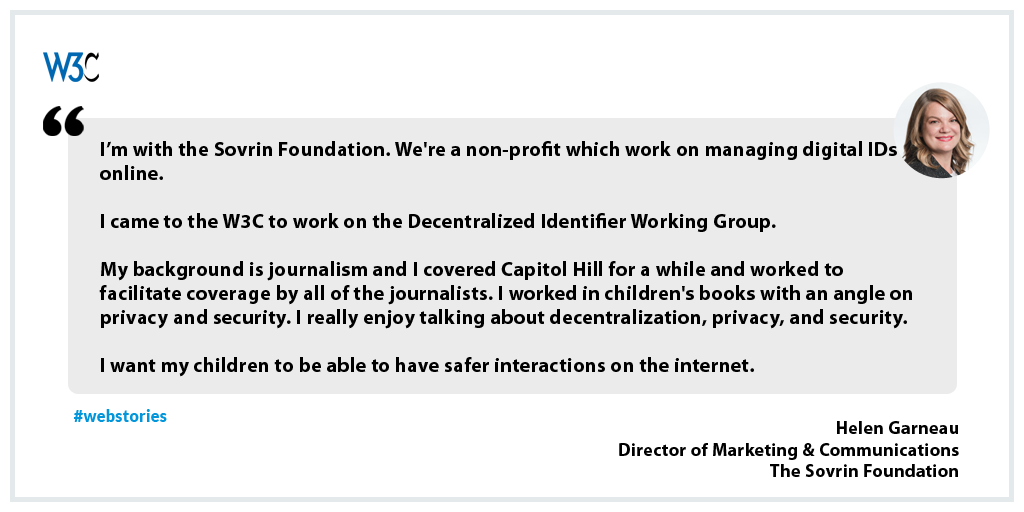
Helen Garneau, Director of Marketing & Communications, The Sovrin Foundation: I’m with the Sovrin Foundation. We're a non-profit which work on managing digital IDs online. I came to the W3C to work on the Decentralized Identifier Working Group.
My background is journalism and I covered Capitol Hill for a while and worked to facilitate coverage by all of the journalists. I worked in children's books with an angle on privacy and security. I really enjoy talking about decentralization, privacy, and security. I want my children to be able to have safer interactions on the internet.
Show Rong Chen's full quote 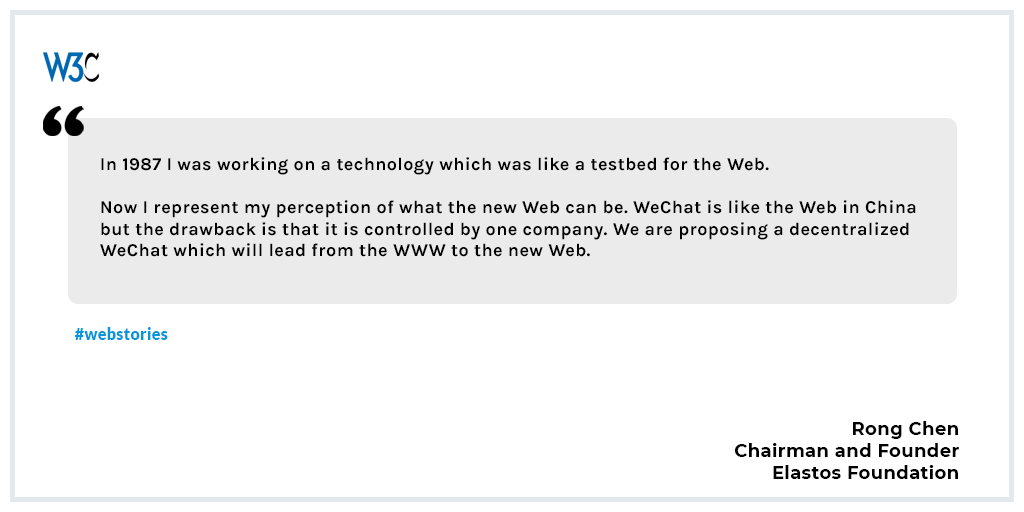
Rong Chen, Chairman and Founder, Elastos Foundation: In 1987 I was working on a technology which was like a testbed for the Web. Now I represent my perception of what the new Web can be. WeChat is like the Web in China but the drawback is that it is controlled by one company. We are proposing a decentralized WeChat which will lead from the WWW to the new Web.Show Wendy Reid's full quote 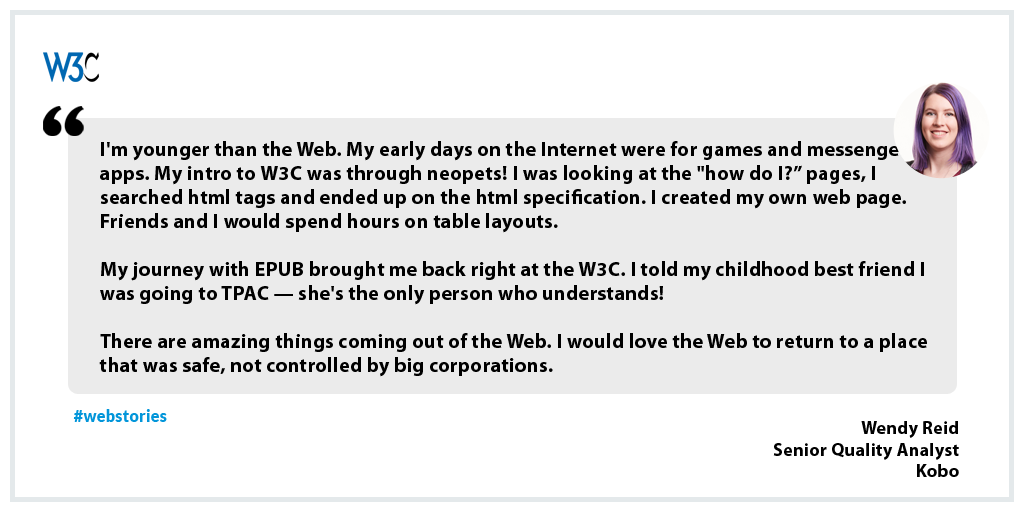
Wendy Reid, Senior Quality Analyst, Kobo: I'm younger than the Web. My early days on the Internet were for games and messenger apps. My intro to W3C was through neopets! I was looking at the "how do I?” pages, I searched html tags and ended up on the html specification. I created my own web page. Friends and I would spend hours on table layouts.
My journey with EPUB brought me back right at the W3C. I told my childhood best friend I was going to TPAC — she's the only person who understands!
There are amazing things coming out of the Web. I would love the Web to return to a place that was safe, not controlled by big corporations.
Show David Ezell's full quote 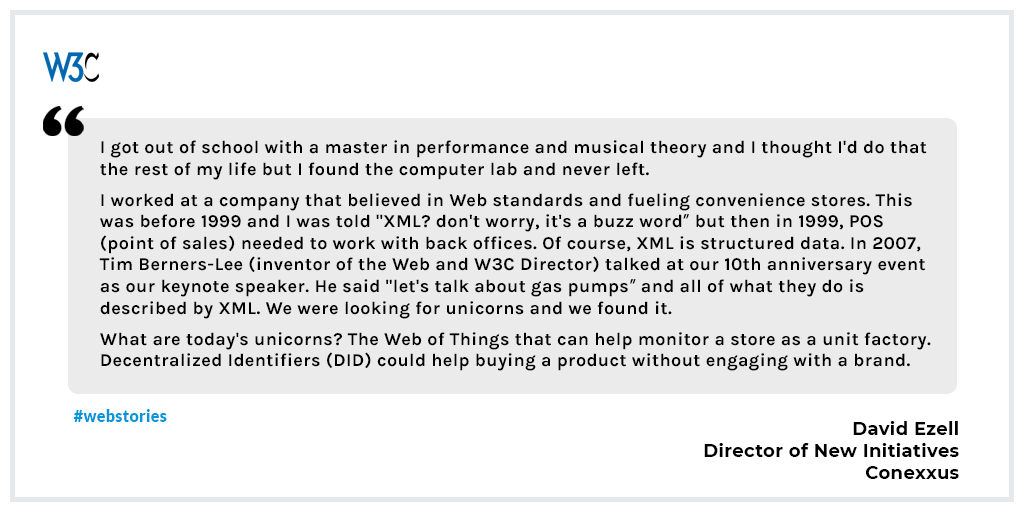
David Ezell, Director of New Initiatives, Conexxus: I got out of school with a master in performance and musical theory and I thought I'd do that the rest of my life but I found the computer lab and never left. I worked at a company that believed in web standards and fueling convenience stores. This was before 1999 and I was told "XML? don't worry, it's a buzz word” but then 1999, POS (point of sales) needed to work with back offices. Of course, XML is structured data. In 2007, Tim Berners-Lee (inventor of the Web and W3C Director) talked at our 10th anniversary event as our keynote speaker. He said "let's talk about gas pumps” and all of what they do is described by XML. We were looking for unicorns and we found it. What are today's unicorns? The Web of Things that can help monitor a store as a unit factory. Decentralized Identifiers (DID) could help buying a product without engaging with a brand.Show Karl Dubost's full quote 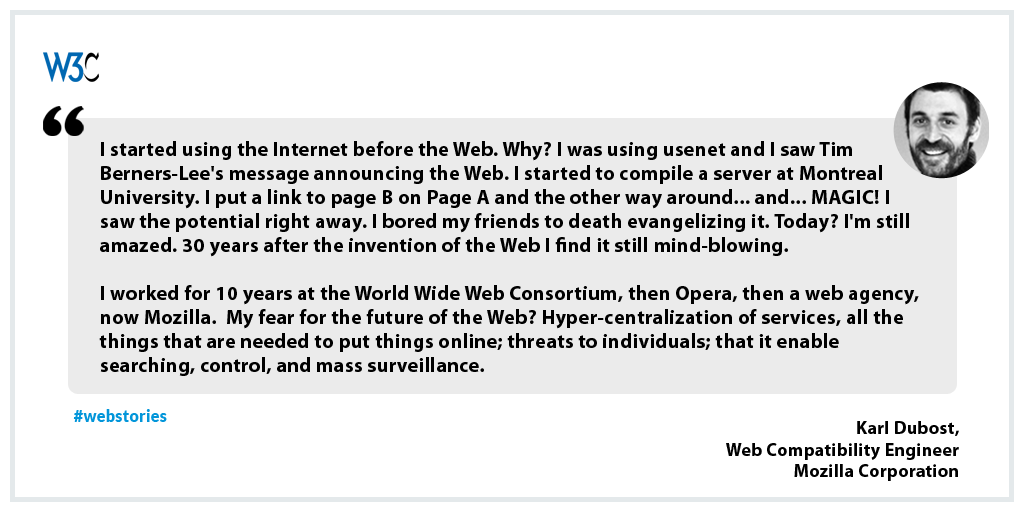
Karl Dubost, Web Compatibility Engineer, Mozilla Corporation: I started using the Internet before the Web. Why? I was using usenet and I saw Tim Berners-Lee's message announcing the Web. I started to compile a server at Montreal University. I put a link to page B on Page A and the other way around... and... MAGIC! I saw the potential right away. I bored my friends to death evangelizing it. Today? I'm still amazed. 30 years after the invention of the Web I find it still mind-blowing.
I worked for 10 years at the World Wide Web Consortium, then Opera, then a web agency, now Mozilla. My fear for the future of the Web? Hyper-centralization of services, all the things that are needed to put things online; threats to individuals; that it enable searching, control, and mass surveillance. My hope for the future of the Web is finding solutions in the protocols and the formats that allow something more distributed.
Show Jun'ichi Yoshii's full quote 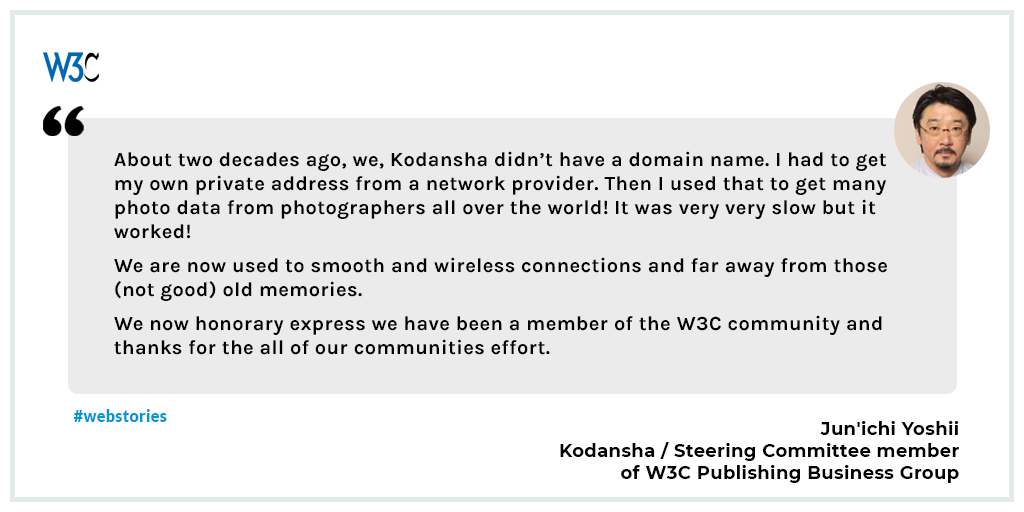
Jun'ichi Yoshii, Kodansha / Steering Committee member of W3C Publishing Business Group: About two decades ago, we, Kodansha didn’t have a domain name. I have to get my own private address from a network provider. Then I used that to get many photo data from all over the world’s photographers! It was very very slow but it works! We are used to this smooth and wireless connections and far away from those (not good) old memories. We now honorary express we have been a member of the W3C community and thanks for the all of our communities effort.Show Ralph Swick's full quote 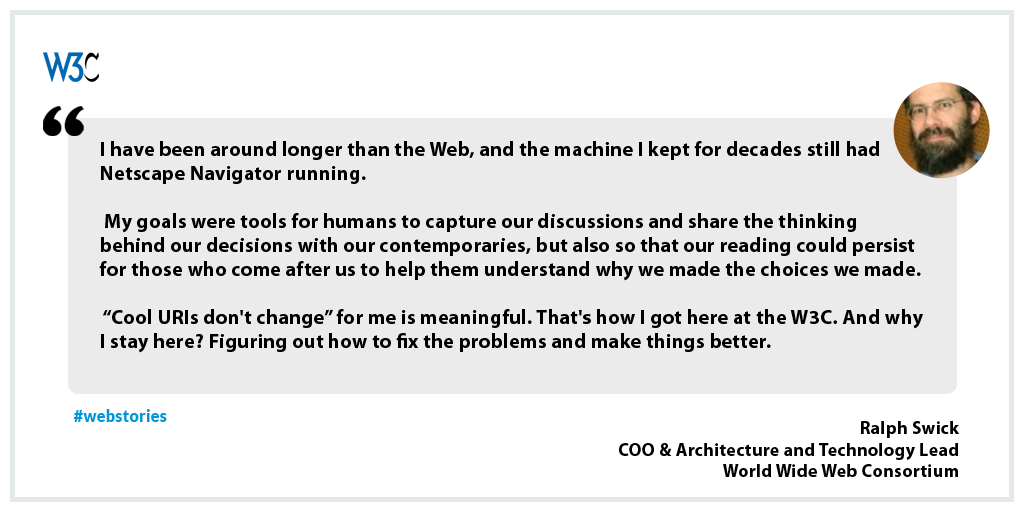
Ralph Swick, COO & Architecture and Technology Lead, World Wide Web Consortium: I have been around longer than the Web, and the machine I kept for decades still had Netscape Navigator running.
My goals were tools for humans to capture our discussions and share the thinking behind our decisions with our contemporaries, but also so that our reading could persist for those who come after us to help them understand why we made the choices we made.
“Cool URIs don't change” for me is meaningful. That's how I got here at the W3C. And why I stay here? Figuring out how to fix the problems and make things better.
Show Coralie Mercier's full quote 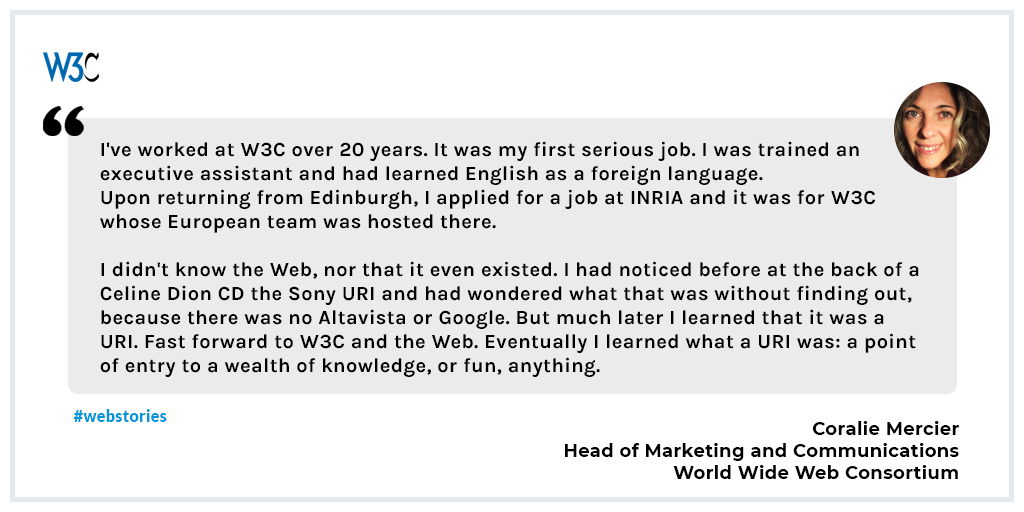
Coralie Mercier, Head of Marketing and Communications, World Wide Web Consortium: I've worked at W3C over 20 years. It was my first serious job. I was trained as an executive assistant and had learned English as a foreign language. Upon returning from Edinburgh, I applied for a job at INRIA and it was for W3C whose European team was hosted there.
I didn't know the Web, nor that it even existed. I had noticed before at the back of a Celine Dion CD the Sony URI and had wondered what that was without finding out, because there was no Altavista or Google. But much later I learned that it was a URI. Fast forward to W3C and the Web. Eventually I learned what a URI was: a point of entry to a wealth of knowledge, or fun, anything.
Show Amy van der Hiel's full quote 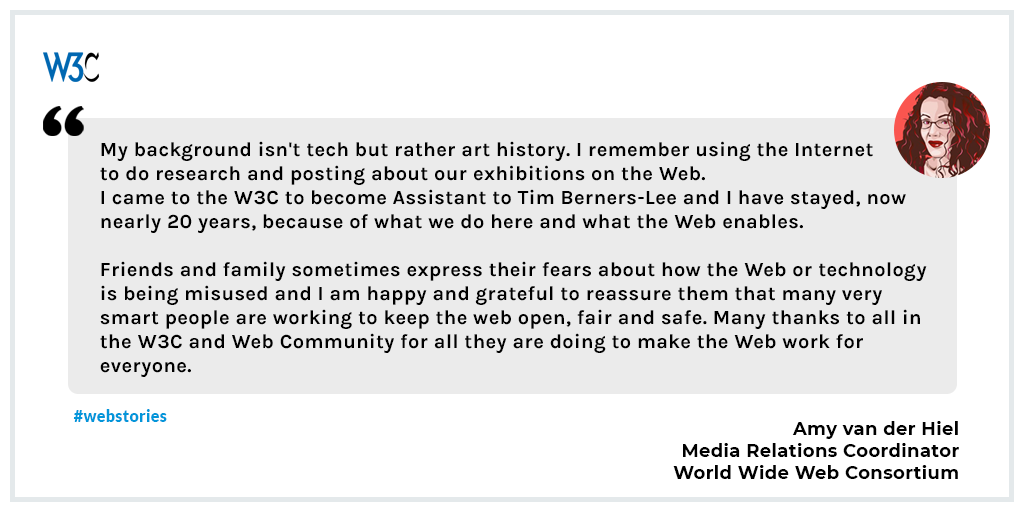
Amy van der Hiel, Media Relations Coordinator, World Wide Web Consortium: My background isn't tech but rather art history. I remember using the Internet to do research and posting about our exhibitions on the Web.
I came to the W3C to become Assistant to Tim Berners-Lee and I have stayed, now nearly 20 years, because of what we do here and what the Web enables.
Friends and family sometimes express their fears about how the Web or technology is being misused and I am happy and grateful to reassure them that many very smart people are working to keep the web open, fair and safe. Many thanks to all in the W3C and Web Community for all they are doing to make the Web work for everyone.
Show Bert Bos' full quote 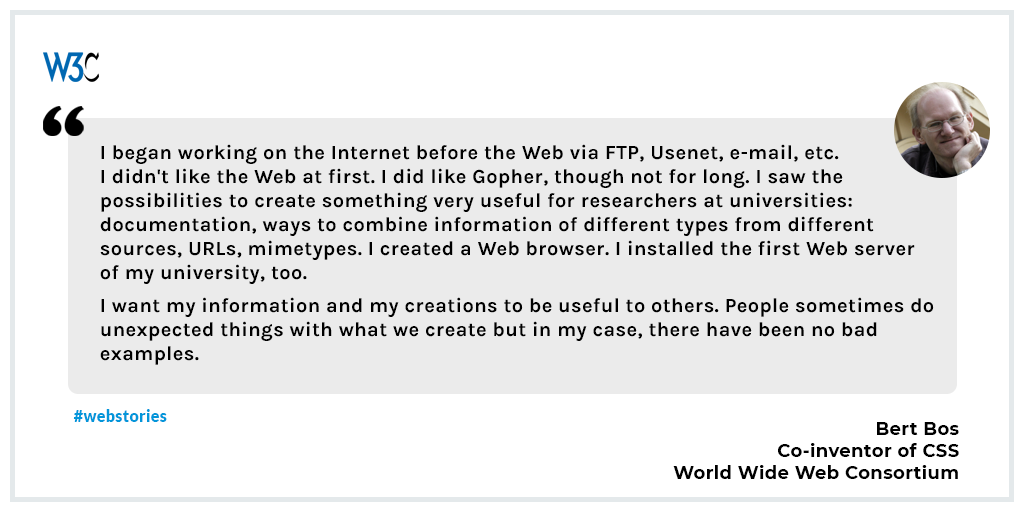
Bert Bos, co-inventor of CSS, World Wide Web Consortium
I began working on the Internet before the Web via ftp, Usenet, e-mail, etc. I didn't like the Web at first. I did like Gopher, though not for long. I saw the possibilities to create something very useful for researchers at universities: documentation, ways to combine information of different types from different sources, URLs, mimetypes. I created a web browser. I installed the first web server of my university, too.
I want my information and my creations to be useful to others. People sometimes do unexpected things with what we create but in my case, there have been no bad examples.
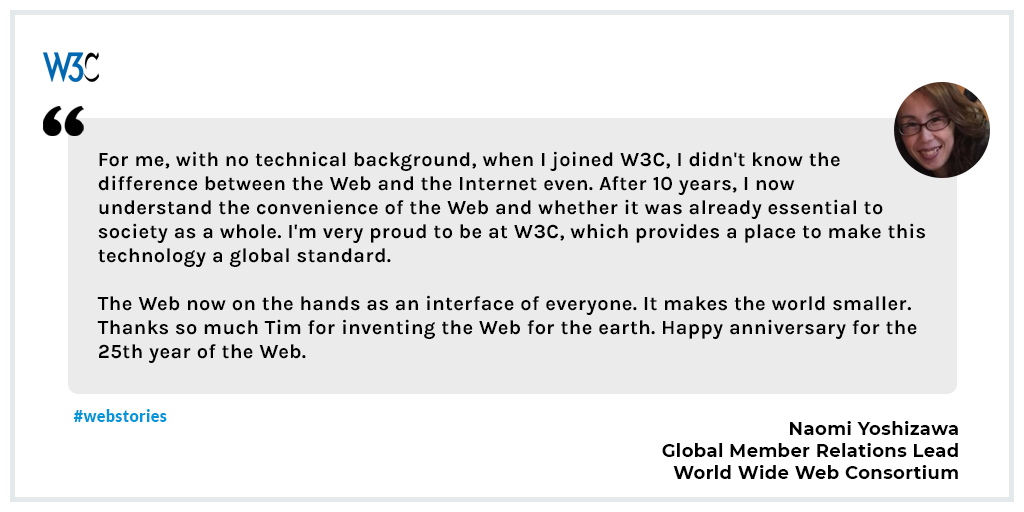
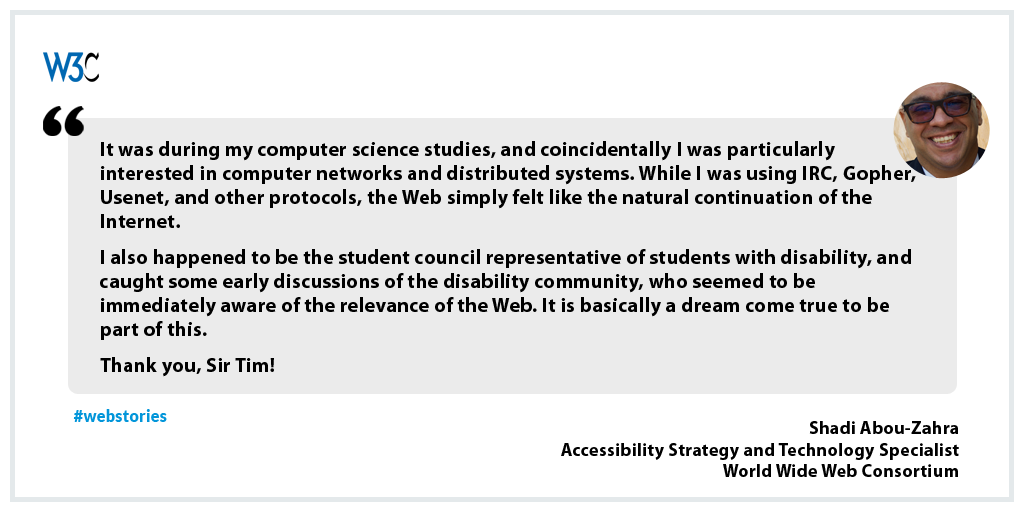
In 1995 I heard about this "internet thing". I thought it would be a good way to keep the fans of my sons high school football program updated.
Taught myself HTML, set up a site and I was off and running.
At 80 I'm still on the sidelines taking photos.
I also now have sites for his girls basketball program and my church.
Amongst those we talked to were some who had helped build the basis of Web technology and had been working in technology before the Web was invented 30 years ago